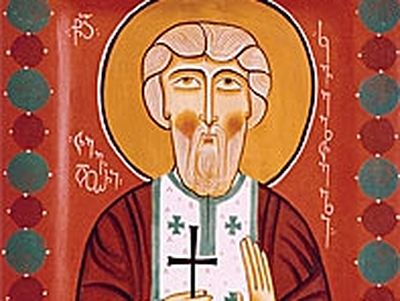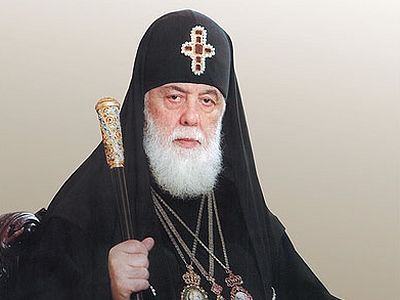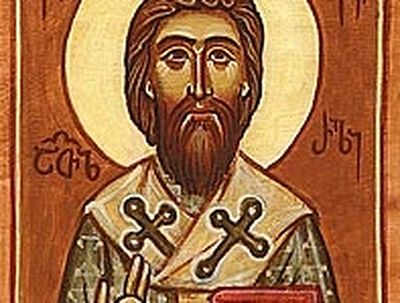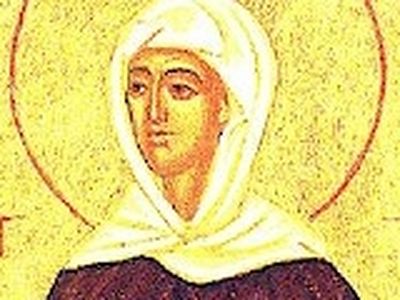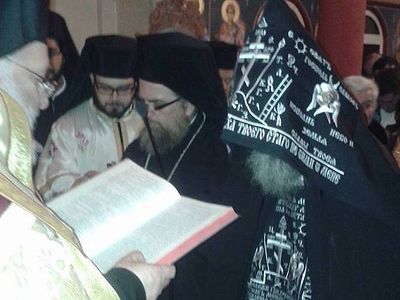Memory 12 (25) June
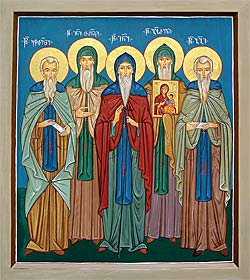 The Holy Georgian Fathers of Iveron: St. Ekvtime, St. Ioane-Tornike, St. Ioane, St. Gabriel, and St. Giorgi.
The Holy Georgian Fathers of Iveron: St. Ekvtime, St. Ioane-Tornike, St. Ioane, St. Gabriel, and St. Giorgi.
|
| The Holy Georgian Fathers of Iveron: St. Ekvtime, St. Ioane-Tornike, St. Ioane, St. Gabriel, and St. Giorgi. |
Tornike Eristavi[1] (later Ioane of Mt. Athos) was a Georgian army commander famed for his victories in war and a favorite of King Davit Kuropalates. Eventually he abandoned his worldly glory and set off in search of his spiritual father, St. Ioane, on Mt. Olympus. There he learned that St. Ioane had moved to Mt. Athos, so he journeyed there and settled with him in a monastery headed by St. Athanasius the Athonite. He was tonsured a monk and given the new name Ioane.
Soon many Georgians became thirsty for the ascetic life and arrived to labor on the Holy Mountain. To serve the young community, St. Ioane built a church in honor of St. John the Theologian and constructed cells nearby. In such a way, the first Georgian community on Mt. Athos was established.
At that time, Bardas Sclerus, commander of the army of Asia Minor, led a revolt against Basil and Constantine, the young Byzantine emperors. The dowager empress Theophania, hoping to receive assistance from Georgia, requested that Ioane-Tornike travel to his homeland, inform the king about the difficult situation in Byzantium, and rally the Georgian armies for support. At first Ioane-Tornike refused, doubting his preparedness to return to life in the world. But after the other brothers pleaded with him and he received St. Athanasius’ blessing, he returned to Georgia and delivered Theophania’s letter to King Davit Kuropalates. The king was overjoyed at the sight of his favorite military leader, and he consented to the empress’ request, provided Ioane-Tornike would command the army. The king was resolute and Ioane-Tornike was compelled to honor his will. With God’s help and under the wise leadership of Ioane-Tornike, twelve thousand Georgian soldiers defeated the army of the godless Bardas Sclerus, banishing the conspirator from Byzantium (ca. 979).
After this great victory Ioane-Tornike returned immediately to Mt. Athos. The brothers met him with great joy and gave thanks to God for returning him safely to the monastery.
St. Ioane-Tornike was a perfect example of humility. He renounced his own will completely and would do nothing without a blessing from his spiritual father. “I entrust myself and my will to you. Save me according to your will!” he would tell St. Ioane.
The brothers of the monastery often asked Ioane-Tornike to recount his military glories, and he was obliged to recall his past. Once St. Ioane requested that he share his memories with a certain Elder Gabriel, a man who spoke not a single vain word. Ioane-Tornike agreed, and after he had narrated his glorious past to the elder, he ceased speaking entirely. He spent the rest of his life in silence, hoping in God, and reposed peacefully.
Armed with a pure soul and wielding prayer like a sword, thou didst destroy the army of the devils, O wonder-working Father Ioane-Tornike. Pray to God without ceasing on behalf of us all!
[1] Eristavi: a Georgian title, meaning literally “head of the army.” An eristavi was the ruler or governor of his province and a pillar of the Georgian monarchy. During certain periods of Georgian history the title was hereditary. The title is equivalent to a European duke.
